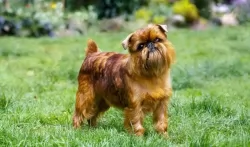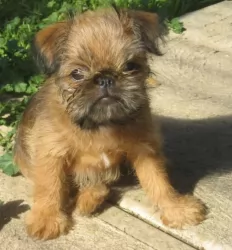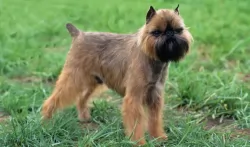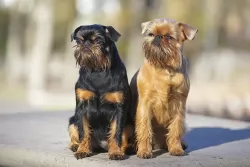 MyDogBreeds
MyDogBreeds German Longhaired Pointer is originated from Germany but Belgian Griffon is originated from Belgium. German Longhaired Pointer may grow 50 cm / 20 inches higher than Belgian Griffon. German Longhaired Pointer may weigh 26 kg / 58 pounds more than Belgian Griffon. Both German Longhaired Pointer and Belgian Griffon has almost same life span. German Longhaired Pointer may have more litter size than Belgian Griffon. Both German Longhaired Pointer and Belgian Griffon requires Moderate maintenance.
German Longhaired Pointer is originated from Germany but Belgian Griffon is originated from Belgium. German Longhaired Pointer may grow 50 cm / 20 inches higher than Belgian Griffon. German Longhaired Pointer may weigh 26 kg / 58 pounds more than Belgian Griffon. Both German Longhaired Pointer and Belgian Griffon has almost same life span. German Longhaired Pointer may have more litter size than Belgian Griffon. Both German Longhaired Pointer and Belgian Griffon requires Moderate maintenance.
 Looking at the German Longhaired Pointer you may think that you’re looking at a type of Setter dog or even a large Spaniel. These pointing dogs, hailing from Germany, are gun dogs or working dogs, having always been used to track game.
Looking at the German Longhaired Pointer you may think that you’re looking at a type of Setter dog or even a large Spaniel. These pointing dogs, hailing from Germany, are gun dogs or working dogs, having always been used to track game.
They were developed at the end of the 19th century, as breeders were specifically looking for a dog that was faster than the wiry- and short hair German pointers. Crossing English Setters and Pointers gave breeders this German Longhaired Pointer and the dog was shown for the first time in Germany in 1879.
Known as the GLP or Deutsch-Langhaar, the dog has the bloodlines of water dogs and scenthounds, and way back In 1897, Baron von Schorlemer wrote the first standard for the German Longhaired.
 The Belgian Griffon isn’t your most attractive dog, but maybe its his quirky, gremlin looks that makes him such an adored pet for many. There are different varieties of Griffon, and the Belgian- and Brussels Griffon are one and the same. All small Belgian dogs have the same breed standards, with the Belgian having a rough coat The dog hails from Belguim and its ancestors were no doubt a mix of the Belgian street dog, the Stable Griffon and the Affenpinscher.
The Belgian Griffon isn’t your most attractive dog, but maybe its his quirky, gremlin looks that makes him such an adored pet for many. There are different varieties of Griffon, and the Belgian- and Brussels Griffon are one and the same. All small Belgian dogs have the same breed standards, with the Belgian having a rough coat The dog hails from Belguim and its ancestors were no doubt a mix of the Belgian street dog, the Stable Griffon and the Affenpinscher.
Later on in the 1800s, this combination was then crossed with the Pug, giving the dog the brachycephalic or flat faced look.
Unfortunately no written records were kept about the precise origin of this breed, but there is also the idea that the King Charles- and English Toy Spaniel were also involved in its development. These small dogs were bred to catch rats in the barns of European estates.
 Athletic and lean, the German Longhaired Pointer is a medium to large sized dog standing at 60 – 70 cm in height and weighing 25 to 32kg.
Athletic and lean, the German Longhaired Pointer is a medium to large sized dog standing at 60 – 70 cm in height and weighing 25 to 32kg.
With his webbed feet, he can move with great speed. It is why the dog isn’t suited well to life in the city really, as he has always been a dog used to working and running over large areas. He will appreciate being with an active owner.
The beautiful double coat is medium length, slightly wavy and with feathering around the legs, chest and tail. The tail itself is carried stretched outwards or kept low. It is rich brown to coppery color, while some white can sometimes be found on the chest and paws. The attractive dog has brown eyes, a black nose and ears which are long and floppy.
Intelligent, gentle and amicable the German Longhaired Pointer is an affectionate, loyal dog who is also social, getting on well with other pets in the home as well as with children.
Being the loyal dog that he is, it makes him susceptible to separation anxiety so he should never be put into the backyard and left day after day on his own.
 There are different variations of this dog to give it its distinctive look and size. This quaint looking little Griffon canine comes with two different coat types - soft or wiry. With the Belgian Griffon, his wiry coat of red, tan or black will need to be brushed at least twice a week. Shedding with this dog is seasonal.
There are different variations of this dog to give it its distinctive look and size. This quaint looking little Griffon canine comes with two different coat types - soft or wiry. With the Belgian Griffon, his wiry coat of red, tan or black will need to be brushed at least twice a week. Shedding with this dog is seasonal.
He has a compact, sturdy little body, and he trots around with attitude. With his sharp pointed ears and whiskers, he has been given the nickname ‘bearded dog’. His dark black eyes are alert. He is self-confident, intelligent and curious breed, a great family pet and good with children if he has grown up with them in the home. He is good with other pets. The fact that this is a small breed and that he doesn’t have excessive energy levels, means he is adaptable to city- and country living.
 German Longhaired Pointers are calm, friendly dogs who want to please their owners. They’re really intelligent too so training and socialization won’t be difficult with this bright dog.
German Longhaired Pointers are calm, friendly dogs who want to please their owners. They’re really intelligent too so training and socialization won’t be difficult with this bright dog.
Once trained, he makes an excellent, loyal and loving family pet. With a firm, kind, consistent type of owner, the German Longhaired Pointer is guaranteed to make you a wonderful pet.
 The Belgian Griffon is an affectionate pet and often establishes a strong bond with one member of the family. You’ll have your Griffon with you for about 15 years so make sure he is trained and a pleasure to have around.They are difficult to train, being somewhat stubborn so they are going to require patience. They’re sensitive too, and they won’t respond well to aggressive treatment.
The Belgian Griffon is an affectionate pet and often establishes a strong bond with one member of the family. You’ll have your Griffon with you for about 15 years so make sure he is trained and a pleasure to have around.They are difficult to train, being somewhat stubborn so they are going to require patience. They’re sensitive too, and they won’t respond well to aggressive treatment.
They’re much more indoor dogs than outdoor dogs because they’re also vulnerable to heat stroke. They just want to come indoors and be with their human family, and when you do that for them, they’ll become a wonderful friend and companion to you.
 You’ll find that with an excellent diet and lots of love and care your German Longhaired Pointer can easily push 12 to 14 years of age.
You’ll find that with an excellent diet and lots of love and care your German Longhaired Pointer can easily push 12 to 14 years of age.
If you’re a novice dog owner, talking with your vet will give you a good idea of how to feed your dog to ensure longevity.
No matter how vibrant and energetic your pet is, there may well come a day when he is lethargic, he just wants to lie, he doesn't want to eat and he doesn’t jump up to greet you. Then it’s time for concern and to get your 4-legged friend to the vet.
There are several health problems associated with dogs that are worth researching – hip dysplasia, skin allergies, progressive retinal atrophy, allergies and cataracts.
 When you get your Griffon from a reputable breeder, you always have a better chance that he’ll be healthy. As it is, the Belgian Griffon has few hereditary health issues. However his dark eyes will have some genetic problems to contend with and he could suffer with progressive retinal atrophy. This is an illness which can lead to blindness
When you get your Griffon from a reputable breeder, you always have a better chance that he’ll be healthy. As it is, the Belgian Griffon has few hereditary health issues. However his dark eyes will have some genetic problems to contend with and he could suffer with progressive retinal atrophy. This is an illness which can lead to blindness
Syringomyelia – this is a neurological condition – an abnormality of the spinal cord – a disease which occurs more frequently in small breeds. It can cause your pet to endure a lot of pain.
Birthing Issues - these little dogs often have problems with giving birth, and a vet often has to intervene and perform a cesarean.
 German Longhaired Pointers have the same kind of nutritional needs as all other active working or sporting dog breeds. He needs high quality food, and if you feed him a commercially manufactured food, make sure its the best and that it has minerals and vitamins for active, large breeds. Most of the dog food companies have breed-specific formulas for size, age and activity levels of dogs.
German Longhaired Pointers have the same kind of nutritional needs as all other active working or sporting dog breeds. He needs high quality food, and if you feed him a commercially manufactured food, make sure its the best and that it has minerals and vitamins for active, large breeds. Most of the dog food companies have breed-specific formulas for size, age and activity levels of dogs.
Always ensure an ongoing supply of cool, fresh water is available to him.
The coat of the German Longhair can become matted and he will require brushing at least twice a week to keep the hair free of loose hairs as well as burrs that could lead to the coat becoming untidy and tangled. The ears will also have to be watched as thick matting can occur. Also check the inside of his ears to avoid dirt and wax build up which can lead to ear infections.
General grooming will also be reqired such as checking the length of the nails if they aren’t naturally worn down. Don’t neglect his teeth and brush 2 or 3x a week with canine toothpaste and toothbrush.
Your German Longhaired isn’t a dog who likes to spend his days lying round. He is energetic and loves to be on the go. From robust ball games to rope games, running with you as you go running, swimming or cycling, this dog can’t seem to get enough exercise and will want to be included in all your activities.
 The Belgian Griffon will do well if you invest in high quality foods. You can make your own, but if you’re concerned about his health, it would be best to check what ingredients should go into his home-prepared meals to ensure he gets all the vitamins and minerals he needs.
The Belgian Griffon will do well if you invest in high quality foods. You can make your own, but if you’re concerned about his health, it would be best to check what ingredients should go into his home-prepared meals to ensure he gets all the vitamins and minerals he needs.
If you want to go with commercially manufactured dog foods, check with your vet about wet- and dry foods. Your vet will help with choosing a food appropriate to his size and age. Always ensure that there is clean, fresh water available to your pet.
Even though he is a small breed, he is fairly active and he will need his fair share of exercise like ball games and walks. Training and socialization are a must for him. You’ll notice that training isn’t particularly easy with this breed, and first time dog owners might not have the patience with him.